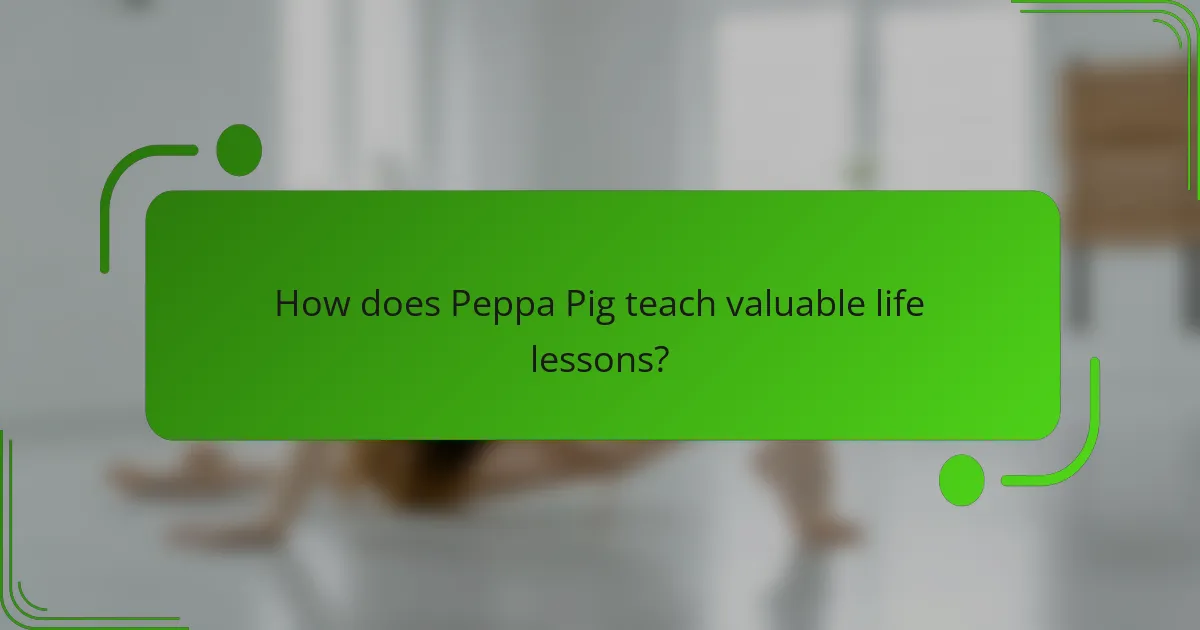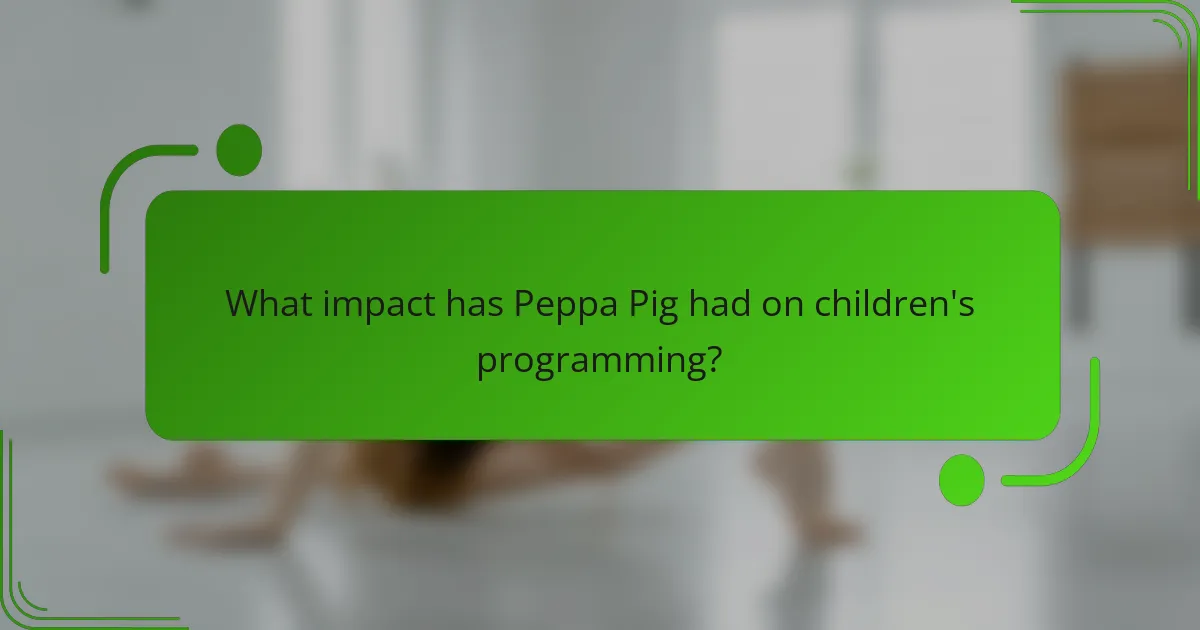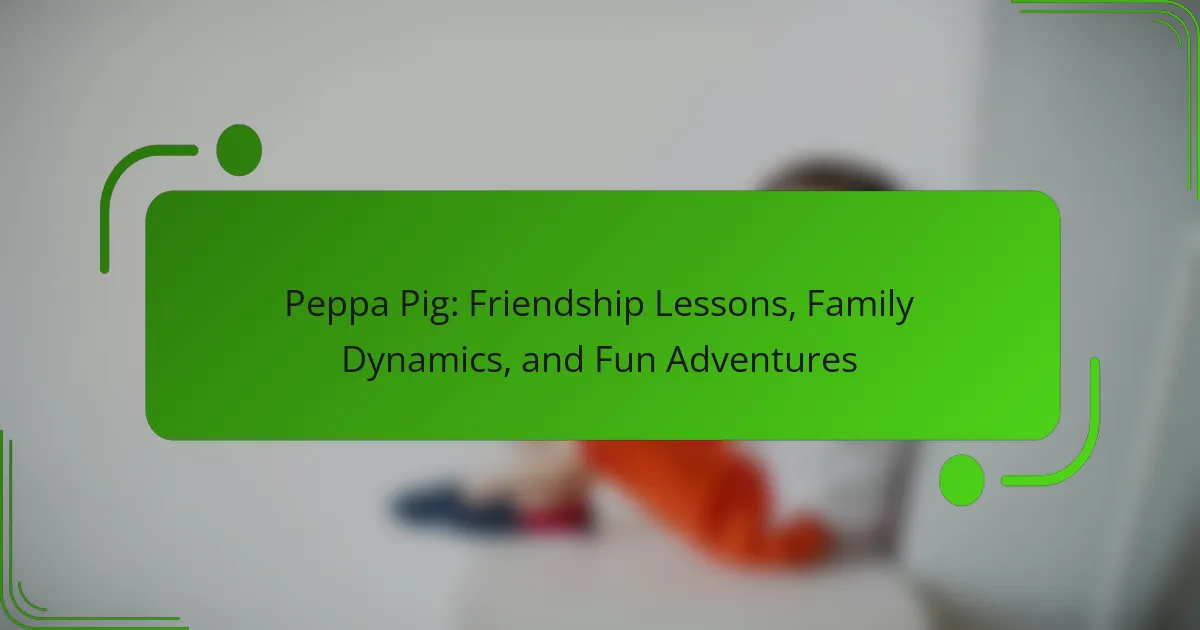Peppa Pig is a children’s animated television series that centers around key themes of family, friendship, and adventure. The show explores family dynamics through the relationships between Peppa, her parents, and her brother George, while also emphasizing the importance of friendship through Peppa’s interactions with her peers. Each episode presents relatable scenarios that teach valuable life lessons, such as cooperation, empathy, and problem-solving. Peppa Pig’s storytelling effectively integrates educational content within entertaining narratives, promoting social skills and emotional understanding among young viewers. The show’s impact on children’s programming is significant, influencing similar content globally and setting new standards for character development and storytelling.

What are the key themes in Peppa Pig?
The key themes in Peppa Pig include family, friendship, and adventure. Family is central to the show, showcasing the dynamics between Peppa, her parents, and her brother George. Friendship is highlighted through Peppa’s interactions with her friends, teaching values of cooperation and empathy. Adventure is depicted in various episodes where Peppa and her friends explore different activities and environments. These themes resonate with young audiences, promoting social skills and emotional understanding. The show’s storytelling effectively conveys these messages through relatable scenarios and characters.
How does Peppa Pig portray friendship among characters?
Peppa Pig portrays friendship among characters through shared activities and emotional support. Characters frequently engage in playdates and adventures together. They demonstrate kindness, empathy, and teamwork in various situations. For example, Peppa and her friends help each other solve problems. They celebrate each other’s successes, reinforcing positive relationships. Episodes often showcase the importance of sharing and taking turns. The interactions highlight the joy of friendship in everyday life. Overall, the show promotes strong social bonds among its characters.
What lessons about friendship can children learn from Peppa Pig?
Children can learn valuable lessons about friendship from Peppa Pig. The show emphasizes the importance of sharing and cooperation. Characters often work together to solve problems, demonstrating teamwork. Conflict resolution is also a key theme; characters apologize and make up after disagreements. Empathy is portrayed through characters understanding each other’s feelings. Peppa and her friends support one another in various situations, showing loyalty. Additionally, the series highlights the joy of spending time with friends, reinforcing social connections. Overall, Peppa Pig teaches children foundational principles of friendship through relatable scenarios.
How do Peppa and her friends resolve conflicts?
Peppa and her friends resolve conflicts by communicating openly and sharing their feelings. They often discuss their problems and listen to each other’s perspectives. When disagreements arise, they practice compromise to find a solution. For example, they might take turns or agree on a fair way to play together. This approach teaches them the importance of empathy and understanding. Additionally, Peppa and her friends often seek the help of adults, like Mummy Pig or Daddy Pig, to mediate when necessary. This reinforces the value of teamwork and collaboration in resolving issues.
What family dynamics are depicted in Peppa Pig?
Peppa Pig depicts a close-knit family dynamic centered around Peppa, her brother George, and their parents, Mummy Pig and Daddy Pig. The family engages in various activities together, showcasing support and teamwork. They often communicate openly, addressing problems and celebrating achievements. The show highlights parental guidance through Mummy Pig and Daddy Pig’s interactions with their children. Sibling relationships are emphasized, with Peppa and George frequently playing and learning together. The family’s adventures often involve cooperation and problem-solving, reinforcing the importance of family bonds. These dynamics contribute to the show’s educational themes of friendship and resilience.
How do Peppa’s family relationships influence her adventures?
Peppa’s family relationships significantly influence her adventures by providing emotional support and motivation. Peppa often embarks on adventures with her family members, such as her brother George, Mummy Pig, and Daddy Pig. Their involvement encourages teamwork and problem-solving during various escapades. For instance, when Peppa and her family go on a picnic, they work together to prepare and enjoy the day. The dynamics of their relationships foster a sense of security and fun. Additionally, family interactions introduce lessons about sharing, kindness, and cooperation, which are central themes in her adventures. These relationships shape Peppa’s experiences and learning outcomes throughout the series.
What roles do each family member play in Peppa’s life?
Peppa Pig’s family members each play distinct roles in her life. Daddy Pig is the provider and often offers guidance, teaching Peppa about responsibility. Mummy Pig is nurturing and supportive, helping Peppa with emotional growth. George, Peppa’s younger brother, is her playmate, encouraging teamwork and sharing. Granny Pig and Grandpa Pig provide wisdom and stories, enriching Peppa’s understanding of family traditions. Each family member contributes to Peppa’s development and happiness through their unique interactions and support.
What types of adventures does Peppa Pig experience?
Peppa Pig experiences various types of adventures that include outdoor activities, family outings, and imaginative play. She often goes on adventures with her family and friends, exploring nature, visiting the playground, or going to the beach. Each episode showcases Peppa engaging in fun activities like jumping in muddy puddles or going on a picnic. These adventures emphasize themes of friendship, cooperation, and learning. The show’s format encourages children to explore their surroundings and bond with loved ones through shared experiences.
How do these adventures promote learning and growth?
Adventures in Peppa Pig promote learning and growth through interactive storytelling. They engage children in problem-solving and critical thinking. Characters face challenges that require cooperation and communication. This fosters social skills and emotional intelligence. Additionally, themes of friendship teach empathy and understanding. Research shows that play-based learning enhances cognitive development. The show’s structure encourages children to explore and ask questions. Engaging narratives support language acquisition and vocabulary expansion. Overall, Peppa Pig adventures create a rich environment for holistic development.
What are some memorable adventures from the series?
Peppa Pig features several memorable adventures throughout the series. One notable adventure is the family’s trip to the beach. They enjoy building sandcastles and playing in the water. Another memorable adventure occurs when Peppa and her friends visit a theme park. They ride roller coasters and enjoy various attractions. Additionally, Peppa’s camping trip with her family is significant. They set up a tent and explore nature together. Each adventure teaches valuable lessons about friendship and family dynamics.

How does Peppa Pig teach valuable life lessons?
Peppa Pig teaches valuable life lessons through relatable stories and characters. Each episode presents situations that children encounter in daily life. Themes include friendship, sharing, and problem-solving. Peppa and her friends navigate challenges together, demonstrating teamwork. The show emphasizes the importance of family, highlighting interactions with parents and siblings. Lessons on empathy and kindness are woven into the narrative. For example, Peppa often helps her friends when they are sad. This reinforces the value of supporting others. Overall, Peppa Pig effectively conveys life lessons through engaging storytelling.
What are the primary life lessons conveyed through the series?
The primary life lessons conveyed through the series include the importance of friendship, family values, and problem-solving. The series emphasizes building and maintaining friendships through sharing and cooperation. Family dynamics are illustrated through supportive interactions among family members. Problem-solving is showcased as characters face challenges and find creative solutions together. These lessons promote social skills and emotional intelligence in young viewers.
How does Peppa Pig address themes of empathy and kindness?
Peppa Pig addresses themes of empathy and kindness through its characters’ interactions and storylines. The show often depicts Peppa and her friends helping one another in various situations. For example, characters frequently express concern when a friend feels sad or unwell. This promotes the understanding of others’ feelings. Additionally, the series encourages sharing and cooperation during playtime activities. Episodes showcase characters resolving conflicts through communication and understanding. These scenarios serve as practical examples for young viewers. Overall, Peppa Pig effectively illustrates empathy and kindness as essential values in friendships and family dynamics.
What role does humor play in teaching these lessons?
Humor plays a crucial role in teaching lessons in “Peppa Pig.” It engages young viewers, making learning enjoyable. Humor helps to simplify complex concepts, allowing children to grasp them easily. For instance, funny situations often illustrate friendship and family dynamics effectively. Research shows that humor enhances memory retention in children. A study by Robert Provine in “The Biology of Laughter” indicates laughter increases learning engagement. Therefore, humor is an essential tool in delivering important life lessons in “Peppa Pig.”
How do the adventures reflect real-life situations?
The adventures in “Peppa Pig” reflect real-life situations by portraying everyday experiences familiar to children and families. Each episode often features relatable scenarios such as playdates, family outings, and problem-solving. Characters face challenges that mirror common childhood issues, like sharing toys or making new friends. These situations teach valuable lessons about cooperation and empathy. For instance, when Peppa learns to share, it resonates with children who navigate similar dynamics in their lives. The show’s emphasis on family interactions showcases typical family roles and relationships. This representation helps children understand their own environments and social interactions.
What relatable scenarios do the characters face?
The characters in Peppa Pig face relatable scenarios such as sharing toys and resolving conflicts. They often encounter situations where they must learn the importance of teamwork. For example, when building a sandcastle, they must work together to achieve their goal. The characters also experience feelings of jealousy when a friend receives special attention. They navigate the ups and downs of friendship through playdates and group activities. Additionally, they deal with family dynamics, such as sibling rivalry and parental guidance. These scenarios reflect common childhood experiences, making them relatable to young viewers.
How can parents use Peppa Pig episodes to discuss real-life topics?
Parents can use Peppa Pig episodes to discuss real-life topics by relating the show’s scenarios to everyday situations. Each episode presents themes like friendship, sharing, and family interactions. For example, parents can discuss the importance of sharing after an episode where Peppa and her friends share toys. They can also address emotions by talking about how characters feel in different situations. Episodes that involve problem-solving can lead to discussions about resolving conflicts in real life. Additionally, parents can use moments that depict cultural practices to introduce children to diversity. This approach fosters understanding and communication about real-life experiences.

What impact has Peppa Pig had on children’s programming?
Peppa Pig has significantly influenced children’s programming by setting new standards for storytelling and character development. The show features relatable characters that resonate with preschool audiences. It introduces themes of friendship, family dynamics, and problem-solving in an accessible manner. The animation style is simple yet engaging, appealing to young viewers. Peppa Pig has also pioneered the integration of educational content within entertainment. Research indicates that its episodes promote social skills and emotional understanding among children. The show’s global reach has inspired similar programming worldwide, emphasizing its lasting impact on children’s media.
How has Peppa Pig influenced other children’s shows?
Peppa Pig has significantly influenced other children’s shows by popularizing simple storytelling and relatable characters. The show’s format emphasizes short episodes, making it accessible for young viewers. This structure has been adopted by many subsequent programs targeting preschool audiences.
Additionally, Peppa Pig showcases family dynamics and friendships, setting a standard for character interactions in similar shows. The emphasis on humor and everyday experiences resonates with children and parents alike. This approach has inspired creators to focus on relatable themes in their content.
Moreover, the animation style of Peppa Pig, characterized by bright colors and simple designs, has been emulated in various children’s series. The show’s success has led to increased demand for educational yet entertaining content. Overall, Peppa Pig’s influence is evident in the evolving landscape of children’s television.
What unique storytelling techniques are used in Peppa Pig?
Peppa Pig employs unique storytelling techniques such as simple narratives, repetition, and relatable scenarios. The show’s simple narratives allow young viewers to easily follow the plot. Repetition reinforces key messages and helps children remember important lessons. Relatable scenarios depict everyday experiences, making the content accessible to preschoolers. Additionally, the use of humor engages children while conveying moral lessons. These techniques collectively enhance learning and retention for the target audience.
How does Peppa Pig engage its audience differently than other shows?
Peppa Pig engages its audience differently through relatable storytelling and simplistic animation. The show features everyday situations that resonate with young children. Characters display emotions and behaviors familiar to preschoolers, promoting empathy and understanding. The humor is gentle and accessible, appealing to both children and parents. Additionally, Peppa Pig utilizes repetition and catchy phrases to enhance memorability. The show’s format encourages audience participation, making it interactive. Research indicates that interactive media can improve engagement and learning in early childhood (Hirsh-Pasek et al., 2015). This combination of elements sets Peppa Pig apart from other children’s programming.
What are some practical tips for parents using Peppa Pig?
Engage with Peppa Pig by watching episodes together. This promotes bonding and discussion. Encourage children to express their thoughts about the characters and stories. Use the show’s themes to teach values like sharing and friendship. Incorporate Peppa Pig-themed activities, such as coloring or role-playing. This enhances learning through play. Limit screen time to ensure a balanced approach to viewing. Discuss the lessons from each episode afterward to reinforce understanding.
How can parents encourage discussions about friendship after watching Peppa Pig?
Parents can encourage discussions about friendship after watching Peppa Pig by asking open-ended questions. They can start by asking what their child liked about the episode. This prompts children to express their thoughts. Parents can then ask about the friendships shown in the episode. They should encourage children to identify traits of good friends. Discussing specific characters and their actions can help. Parents can also share their own friendship experiences. This creates a relatable context for children. Engaging in role-play based on the show can reinforce these lessons. These methods foster deeper understanding of friendship values.
What activities can enhance the lessons learned from Peppa Pig?
Engaging in role-playing games can enhance the lessons learned from Peppa Pig. Children can act out scenes from the show, which reinforces themes of friendship and family dynamics. Creating art projects inspired by characters promotes creativity and discussion about the show’s values. Group activities like building a Peppa Pig-themed obstacle course encourage teamwork and physical activity. Storytelling sessions where children share their own adventures can foster imagination and communication skills. Cooking simple recipes featured in the show can teach life skills and healthy eating. These activities align with Peppa Pig’s educational content, making learning enjoyable and memorable.
Peppa Pig is a children’s animated series that emphasizes key themes of friendship, family dynamics, and adventure. The show illustrates how Peppa and her friends navigate various social situations, teaching valuable lessons about sharing, cooperation, and conflict resolution. Family relationships play a crucial role in shaping Peppa’s adventures, showcasing support and teamwork among family members. Additionally, the series employs relatable scenarios to promote emotional understanding and social skills, making it a significant influence in children’s programming. Overall, Peppa Pig effectively conveys life lessons through engaging storytelling and character interactions.
